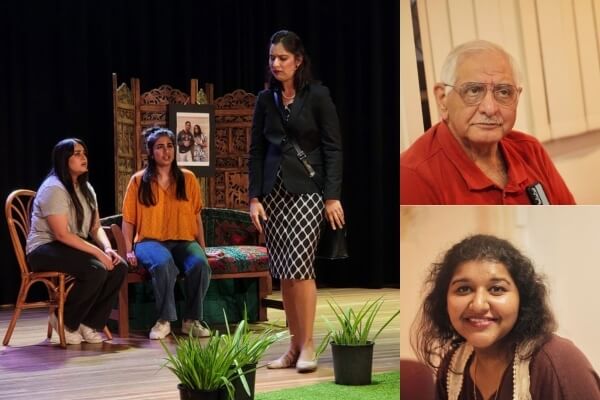There was a particular moment in the play Rising From the Ashes when director Dinsha Palkhiwala knew he had touched a chord with the audience.
“When the lead character Nitya was steadied by Mrs Pathak, the lawyer who helped her get across the line in her traumatic journey, all you could hear was her heavy breathing,” he told Indian Link.
Even as Nitya hyperventilated, the audience held their collective breath, knowing the moment of redemption had come. The 21-year-old was meeting her father for the first time – in prison – after he took the life of her mother 16 years ago.
And yet, Palkhiwala had already won his audience over, shortly after the play commenced.
This is a project emerging from deep within Palkhiwala’s heart, based loosely on his own family, having lost a loved one to intimate partner violence. However, this thespian of the stage turned it around to make it an uplifting story of the process of healing, if indeed one can fully heal from such a life-altering experience.
In the play, Malti and Shashi Sood raise their granddaughter Nitya, after losing their daughter at the hands of her partner. A bright and outgoing young woman, Nitya’s inner demons come to the fore as her father makes contact for the first time from behind prison walls. It is up to her now to protect her family, and herself, from further suffering.
Actor Shalvi Singh captured the essence of her role as Nitya. From the disquiet of vulnerability to explosive passion, she made every scene riveting, drawing all eyes to her performance. In her pivotal scenes – every line and gesture executed with precision and purpose and unforgettable intensity – she left the audience moved and inspired. A compelling performance from an emerging actor.
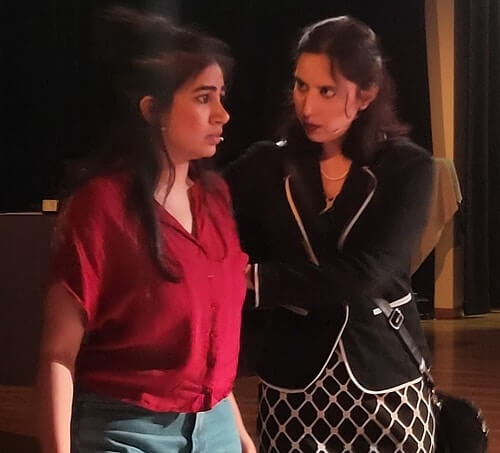
Saral Somaiya excelled in her role as Nitya’s grandmother Malti Sood. The weight of her loss as a mother was palpable throughout. But what shone through, beyond the grief in her shattered persona, was a cascade of other emotions – anger, guilt, distress, anxiety, even composure – as she navigated her bereavement and sought a way to continue living. Bravo, Saral.
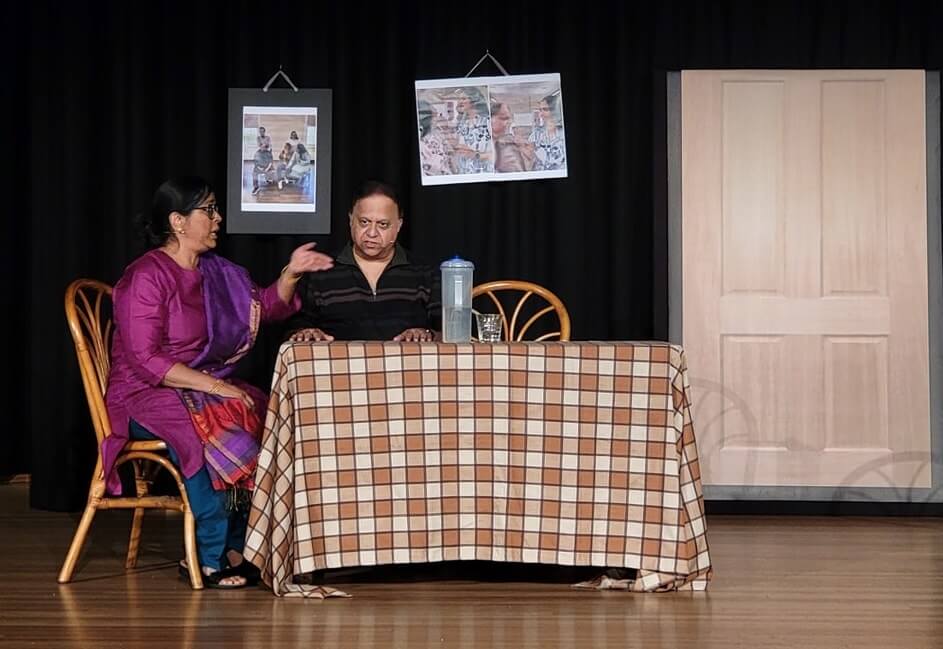
Nasir Sirguroh as the grandfather Shashi Sood was effective as the family member trying to keep it all together for the sake of the others. His cheerful disposition went some way in lightening the load of daily living for those around him. Ultimately, when facing another massive blow, stepping out from the shadows were the camouflaged bits of his fractured self. rising from the ashes
Mittal Bhavsar as Yash, the jailed perpetrator of the awful crime, also acquitted himself brilliantly. He demonstrated no remorse whatsoever, his lack of control coming through in his jerky physical movements even as his coercive control transferred from his wife to his daughter.
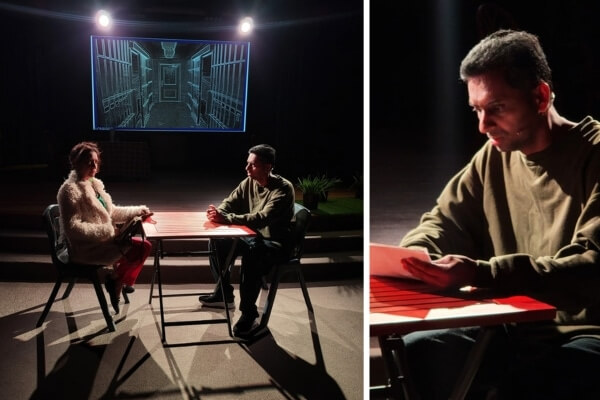
Serving as foil to Yash, Akash (Abhishek Mehrotra) as the family friend grew into his role gradually. His gentleness was convincing, in sharp contrast to the brusqueness of Yash. Providing energies from either end of the spectrum in this story, both actors stepped up admirably.
So did actors Meena Mahanty Kumar and Gargi Bellave as Nitya’s paternal grandmother and friend respectively, who had their own part to play in the unfolding of this narrative.
Rimmika Shankar, poised and in control as the lawyer, came across as a breath of fresh air amidst the ongoing torrent of emotions. (And yet, so strong was the tide that she herself got caught up in it and had her own moment, in perhaps the sole superfluous element in an otherwise layered production).
Nonetheless, it was abundantly clear that scriptwriter Vrishali Jain had got her brief down pat: to demonstrate the impact of domestic violence on each surviving family member; that said impact is just as severe as the crime itself, and that dozens of people suffer in its aftermath for years to come.
Of course, in the process, Jain and Palkhiwala poignantly skimmed over the issues surrounding gendered violence: the irrational rage, the coercive control, the attempts to carry on in the hope that things will get better, the social stigma – all talking points that must be revisited in understanding this scourge in society.
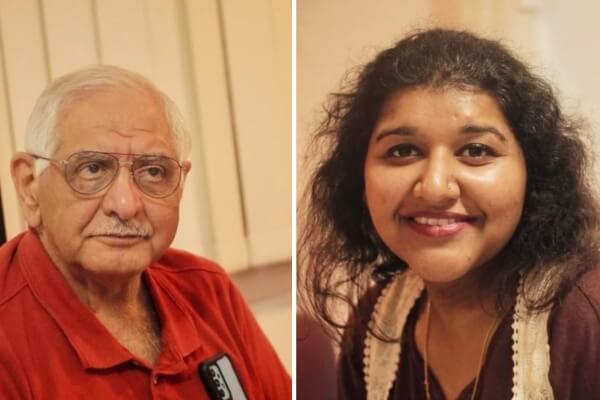
With her painstaking research on victims of domestic violence, including interviews within women’s refuges, Vrishali has stamped herself in as a writer to watch in our community’s burgeoning theatre scene. What impressed was her nuanced and authentic delivery of a tale of raw emotion. (For example, was the relationship between grandmother and granddaughter stereotypically chaste and saccharine sweet? No, they were at loggerheads frequently – and making up just as easily!)
For producer-director Dinsha Palkhiwala himself, this production marks a step up in the innovations he introduced in his play The Peripheral only months ago: the multimedia elements showed a significant sophistication this time round.
Regarding the genesis of this play, Palkhiwala claims to have been influenced by the work of the Sydney NGO Harman Foundation headed by Harinder Kaur. “Harman Foundation helps many women who are rising from the ashes of family violence,” he recounted. “This was our attempt to help them fund-raise, and also to raise awareness that this issue is not just a family problem, but a social issue.”
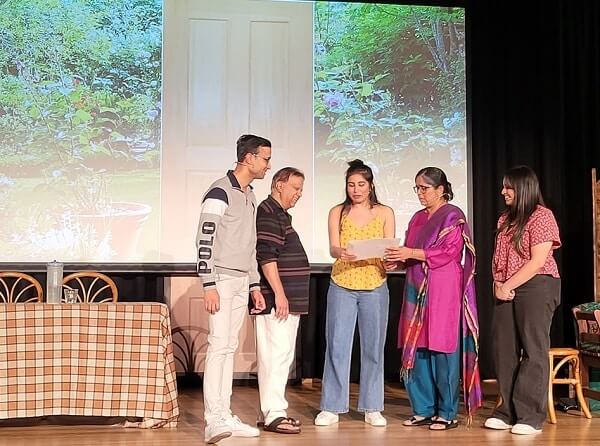
His own personal motivations are not hard to see; with this immersive experience, he has successfully provided insights into the many families that have had to face a similar transformative situation.
Helping him in this have been the inputs from his team at Natak Mandali – including Pankaj Upadhyay’s poetry, Sadiq Rehmani’s music, Abdul Sajwani’s sound, Sandhya Bose’s make up and costumes, Kamini Pandya’s stage management, and Tushar and Naishadh’s audiovisuals. They threw themselves into this project as a salute to the Palkhiwala family – for rising from the ashes in their own lives.
A final comment: this play deserves to be seen again.
READ ALSO: Review: Natak Mandali’s Black With Equal



